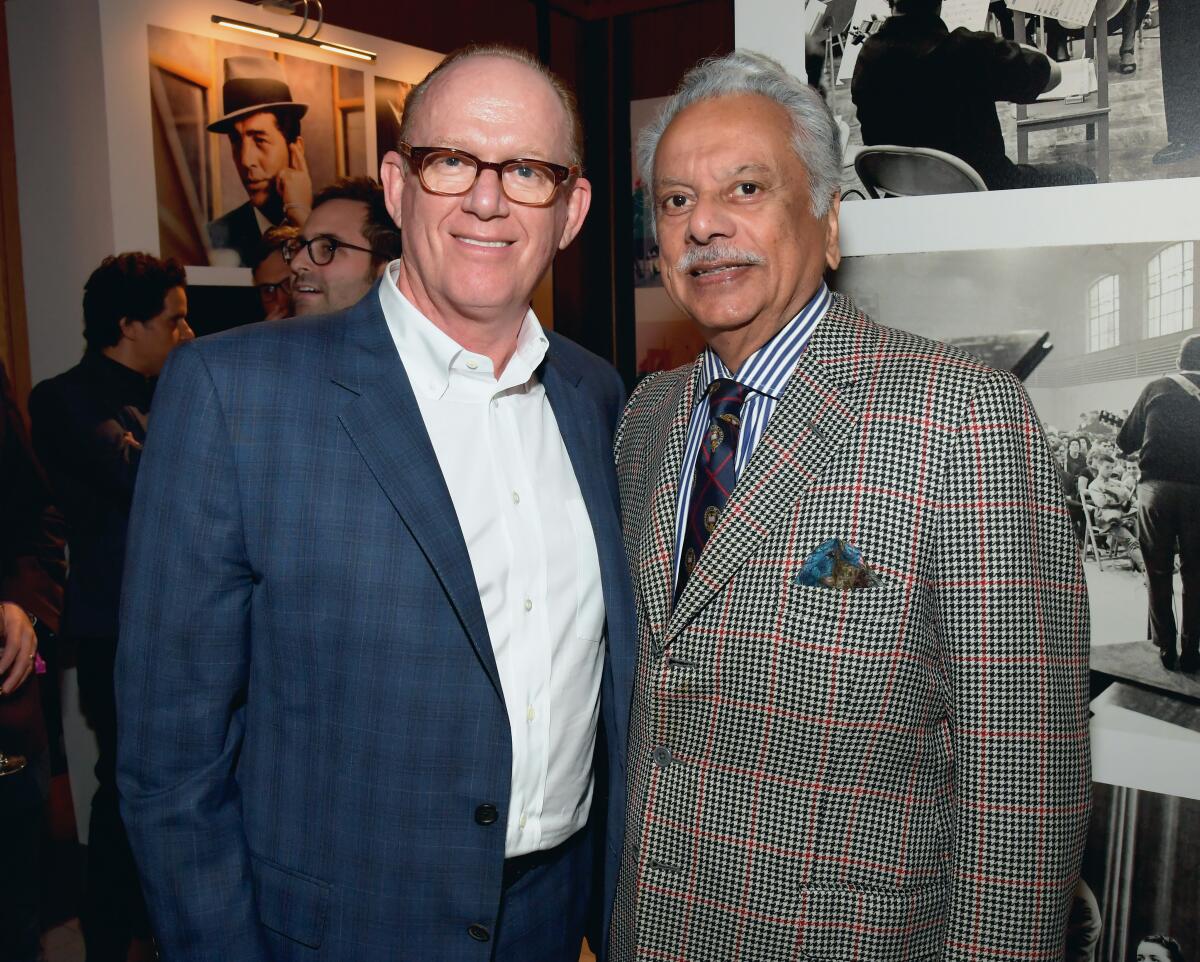Bhaskar Menon, first Asian handed the reins of major U.S. record label, dies

- Share via
When Bhaskar Menon learned Capitol Records was on the verge of losing Pink Floyd’s next album, he immediately took a flight to the South of France to salvage the relationship. The band’s previous album, “Meddle,” performed poorly in the United States — and the group blamed the record label.
After the band’s performance, the members met with Menon and engaged in an all-night negotiating session until they reached an agreement. Menon, the newly appointed president and chief executive of the record company, documented the agreement on a cocktail napkin and flew back to Los Angeles to notify the legal team.
In 1973, Pink Floyd’s “Dark Side of the Moon” went on to become one of the biggest-selling and most influential albums of the rock era, selling more than 15 million copies in the U.S. alone. This feat also helped elevate the struggling record label’s status back to a heavyweight music industry brand.
“Sometimes companies get it right, sometimes it doesn’t happen,” Rupert Perry, a longtime top official at EMI and Capitol said. “He understood the importance of that particular release of that particular time to Capitol Records.”
Menon, the first Asian asked to oversee one of the world’s largest music conglomerates and more or less save Capitol Records, died March 4 at his Beverly Hills home, his wife, Sumitra, confirmed to the New York Times. He was 86.
“Determined to achieve excellence, Bhaskar Menon built EMI into a music powerhouse and one of our most iconic, global institutions,” Lucian Grainge, chairman and chief executive of Universal Music Group, said in a statement. “Music and the world have lost a special one. Our hearts go out to his loved ones.”
A longtime Los Angeles resident, Menon was born in 1934 in Thiruvananthapuram, India. He gained his appreciation for music through his mother, Saraswathi, who often filled their home with Indian ragas. His father, K.R.K. Menon, served as India’s finance minister.
Menon earned his education at St. Stephen’s College in Delhi before earning his master’s degree from Christ Church, Oxford. He got his first break into the global music industry in 1956 with a professor’s help.
The story goes that he was personally hired as a management trainer by Joseph Lockwood, chairman of EMI Music Worldwide, the United Kingdom-based company that owns Capitol Records. Under the music division, Menon learned the ropes working with Beatles producer George Martin. It marked the beginning of his successful, decades-long career.
He climbed the ranks, becoming chief executive of the Gramophone Company of India, an EMI subsidiary, and later managing director of international operations in London and then chairman in 1969. He landed in Los Angeles two years later.
Meanwhile, at Hollywood Boulevard and Vine Street, Capitol Records was in a state of decline after more than a decade of rapid growth. It had established itself as a powerhouse with acts such as Billie Holiday, Nat King Cole and Les Paul on its roster. But as rock ‘n’ roll took over the airwaves, Capitol Records failed to adapt. For a while, the Beatles and the Beach Boys helped anchor the record label until the Fab Four formed their own label.
Concerned with the company’s direction, officials tapped Menon to fix the issue — and he was successful.
He ensured contracts were extended for acts such as Grand Funk Railroad. He also was instrumental in Pink Floyd’s career in the U.S. After it failed to publicize “Meddle,” he made it the company’s priority to launch the band’s eighth studio album into stardom.
“The story in America was a disaster, in that we really hadn’t sold records,” Pink Floyd drummer Nick Mason said in the 2003 documentary “The Making of the Dark Side of the Moon.” “And so, they brought in a man called Bhaskar Menon who was absolutely terrific. He decided he was going to make this work, and make the American company sell. And he did.”
Menon’s temporary move turned into his permanent home. In 1978, he was appointed chairman and chief executive of EMI Music Worldwide. He held that position for 12 years and expanded the company’s roster to include big name acts such as the Rolling Stones, Queen, David Bowie, Iron Maiden, Duran Duran and Tina Turner. NME, Britain’s music and culture magazine, dubbed Menon as “The Man Who Really Runs Rock & Roll” in 1978.
In 1990, the International Federation of the Phonographic Industry awarded Menon its Medal of Honor for his services to the worldwide music industry after serving as chairman of the IFPI for years. During his final years, he worked as a strategic advisor and board member for various companies such as NDTV India.
Perry, his colleague of 25 years, described Menon as an “amazing intellect” with an “encyclopedic knowledge of the worldwide record business.”
“He was a very special, unique individual to work for,” he said. “He was very encouraging. Very supportive of whatever it was you were trying to do or achieve. He was also a good listener.”
Menon’s motto for employees was: “Uncompromising excellence in what you do goes without saying. We expect more than that.”
Menon is survived by his wife, Sumitra, sons Siddhartha and Vishnu, and a sister, Vasantha Menon.
More to Read
Start your day right
Sign up for Essential California for the L.A. Times biggest news, features and recommendations in your inbox six days a week.
You may occasionally receive promotional content from the Los Angeles Times.








